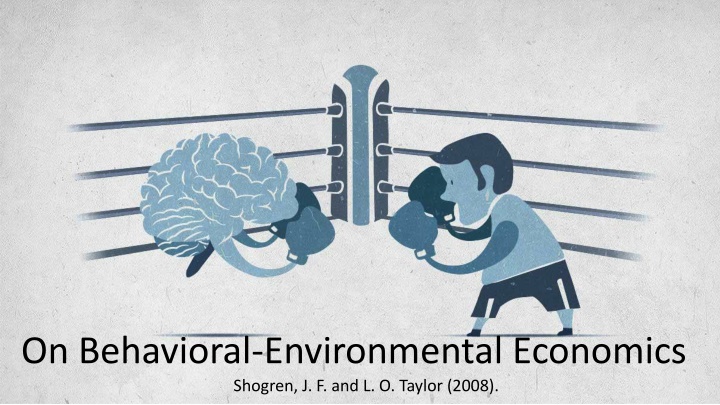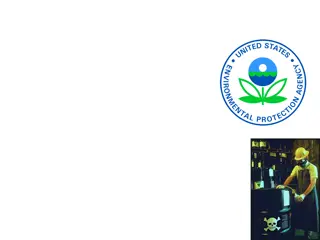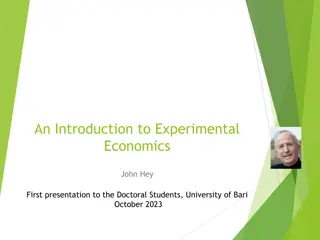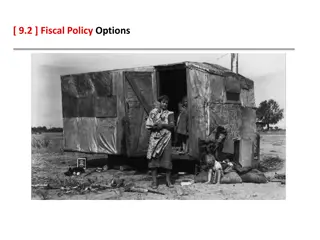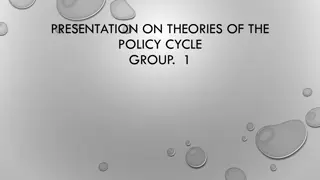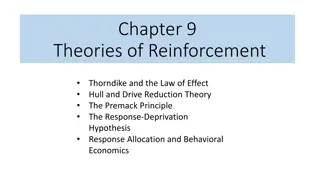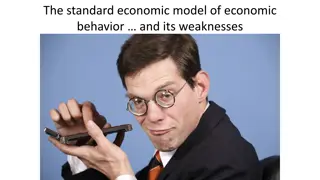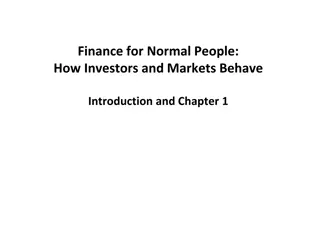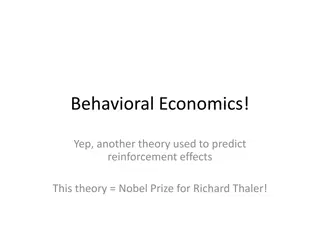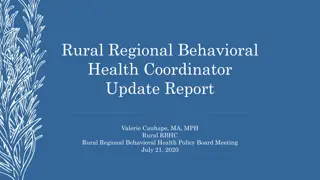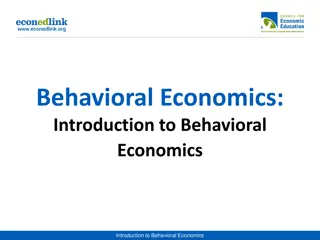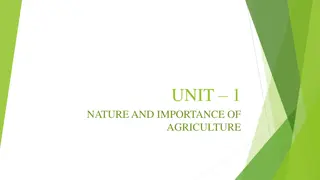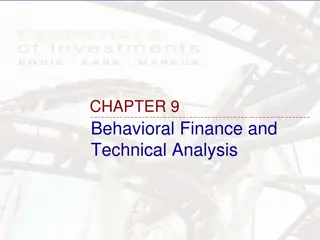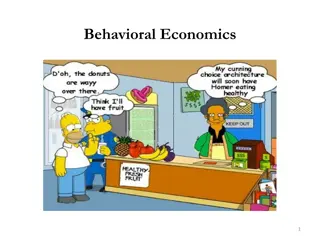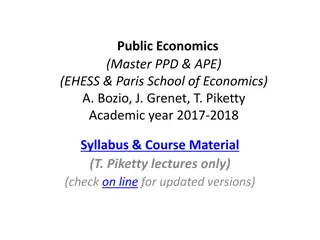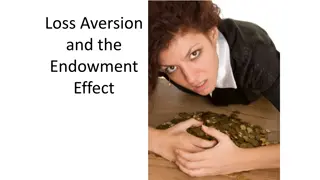Behavioral-Environmental Economics: Exploring Policy Implications
Jason Shogren and Laura Taylor examine how behavioral failures impact environmental policy, drawing parallels to market failure and proposing strategies such as liability rules, marketable permits, and Pigovian taxes to address these failures. Their work combines insights from behavioral economics with traditional economic theory to enhance environmental and resource economics through a nuanced understanding of human behavior and decision-making processes.
Download Presentation

Please find below an Image/Link to download the presentation.
The content on the website is provided AS IS for your information and personal use only. It may not be sold, licensed, or shared on other websites without obtaining consent from the author.If you encounter any issues during the download, it is possible that the publisher has removed the file from their server.
You are allowed to download the files provided on this website for personal or commercial use, subject to the condition that they are used lawfully. All files are the property of their respective owners.
The content on the website is provided AS IS for your information and personal use only. It may not be sold, licensed, or shared on other websites without obtaining consent from the author.
E N D
Presentation Transcript
On Behavioral-Environmental Economics Shogren, J. F. and L. O. Taylor (2008).
About the authors Jason Shogren Stroock Professor of Natural Resource Conservation and Management, Economics & Finance, College of Business University of Wyoming Prof., Environmental Sciences, Ume University research interests revolve around the private motives of public policy Laura Taylor Professor of Agricultural and Resource Economics, North Carolina State University Director, Center for Environmental and Resource Economic Policy CEnREP scholars advise and train policymakers and practitioners
The authors purpose is to expand environmental and resource economics through behavioral economics The authors pose four main questions [p27]: 1. How can behavioral failures affect thinking about environmental policy? 2. When are behavioral failures relevant to the science of environmental and resource economics? 3. Is behavioral failure just another form of market failure? 4. Do we have a new behavioral-environmental second-best problem?
How can behavioral failures affect thinking about environmental policy?
Behavioral failure Behavioral failure is analogous to market failure failure: market Loss aversion Externalities Coherent arbitrariness Nonrival goods Preference reversal Nonexcludable benefits Time- inconsistent Nonconvexities Social preference for emotive ideas Asymmetric information Bounded rationality, willpower and self-interest Entitlements, fairness, endowment effects, self-serving bias etc.
The taxonomy taxonomy of failures rules and incentives to reverse the failure failures is used to design policies, ? Liability rules Marketable permits Marketable permits ? Collective sharing rules ? Pigovian taxes ? Mechanism designs ?
Behavioral economics explains deviations from rational choice theory. When markets are missing or constructed, behavioral failures affect policy outcomes. [29] Rational Choice Theory Neoclassical framework Equimarginal rule of efficiency (MC=MB) WTP = WTA Market-like arbitrage motivates rational behavior/reverse market failure People can learn to be rational Those with complete control offer nothing to others Behavioral Economics Nonmarket valuation: WTA > WTP (endowment effect) Conflict and cooperation: Rules affect/are affected by cognitive bounds Willing punishers and conditional cooperativesUnderestimation of Risk Control: In 40% of observed bargains, those in control share their wealth [33]
Behavioral factors influence institutional designs and mechanism designed to manage market failures. Policy-makers should be interested in how different bargaining rules and protocols affect behavior and outcomes. Bounded selfishness (altruism) and Pigovian tax design (example on p33): Myopic and time- inconsistent addictive behavior Increased consumption of addictive good Externality resulting from increased consumption Optimal environmental tax > standard Pigovian tax Rational addiction
When are behavioral failures relevant to the science of environmental and resource economics?
Behavioral failures exist in the tails of the distribution, and potentially in systemic and institutional designs resulting in nontrivial deviations from efficiency. [34] For relevancy to policy-making, anomalous behaviors must be non- trivial Rational behavior (?) Observed laboratory behavior may not be great predictor of naturally occurring behavior in non-lab settings. Behavioral failure Behavioral failure
Is behavioral failure just another form of market failure?
How you relate market and behavioral failures depends on your perspective. Rationality is individually constructed, hardwired into our DNA. Rationality is socially constructed through interactions with markets, and exchange institutions. Rationality spillover perspective sees behavioral failure as a form of market failure. Continued market failure Behaviora l failure Market failure
Do we have a new behavioral- environmental second-best problem?
Theory of Second Best: Theory of Second Best: given 2 imperfections, correcting 1 failure doesn t guarantee increased social welfare In other words, the absence of any of the jointly necessary conditions does not imply that the next-best allocation is secured by the presence of all the other conditions. [ ] The second-best scenario may require that other of the necessary conditions for optimality also be absent maybe even all of them. Free Exchange (2007) The Economist
Assuming market and behavioral failures exist simultaneously, without addressing both could see reduced social welfare, overall. Authors argue for adaptive regulatory schemes to adjust market-failure regulations for behavior failures, as they arise. Nearly impossible to correct all behavioral failures in one mechanism (separability assumption)
In Conclusion In Conclusion Researchers need to keep identifying instances where rational choice theory succeeds and fails. Environmental and resource economics may suffer if it relies on the standard model of a rational actor, because that model excludes behavioral failures of human nature BUT behavioral economics evidence is insufficientfor a wholesale rejection of rational choice theory.
Critiques Are marketable permits really the most effective at correcting behavioral failures? Marketable permit systems, provided they are active exchange institutions, could be the most effective behavioral disciplining device, or at a minimum, the institutional design least affected by behavioral failures [40] Evidence may be insufficientfor a wholesale rejection of rational choice theory- but their recommendation was more about increasing awareness/research and using a strong inference approach. Is this a sufficient response? Discussion of new (soft) paternalism and related justifications for government intervention into personal choices. Which behavioral failures that are the most relevant for environmental policy?
